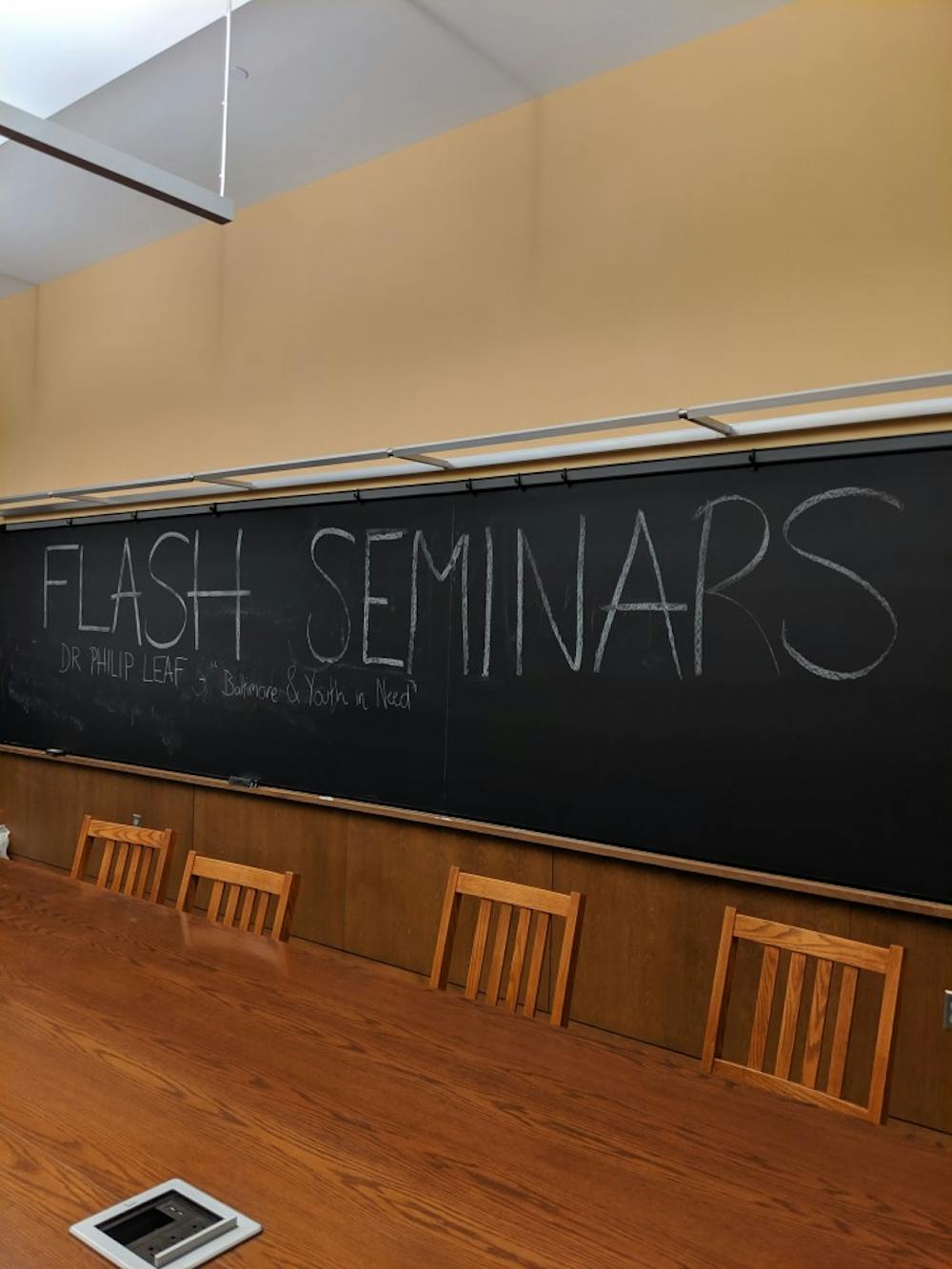Philip Leaf led a discussion about Baltimore’s so-called squeegee kids at a Flash Seminar in Gilman Hall on Thursday, Oct. 10. Squeegee kids are Baltimore youth who, using squeegees and spray bottles, clean windows and windshields at busy intersections in order to earn money.
Flash Seminars at Hopkins allow students and a professor to engage in an hour-long discourse surrounding a topic of the professor’s choice. Leaf, the director of the Center for Adolescent Health at the Bloomberg School of Public Health, explained why he chose this issue.
“[Squeegee kids] might be... something that they’ve driven by on the way to the East Baltimore campus, seen on the news or certainly heard about,” Leaf said. “A large number of them are doing it because their family needs money to pay their rent, or have food or other things.”
For decades, the issue has raised concerns about the safety of both drivers and the children themselves. In addition, business leaders met last month with Mayor Bernard “Jack” Young to discuss how the presence of squeegee kids might damage the quality of life for people who work or live downtown.
Leaf noted that the knowledge of the squeegee youth patterns comes from the Mayor’s office, which interviewed several squeegee kids in order to develop a plan to address the issue.
Leaf said that when they were interviewed by the Mayor’s office, most squeegee kids reported that they do it for the sake of earning additional income for their family either after school or even during business hours.
He explained that this trend underscores the larger issue that parents’ wages are insufficient to keep their families financially solvent.
According to Leaf, most squeegee kids are male and aged 14 to 21. While earnings can vary, he said, most have reported receiving up to $240 in one day. He added that squeegee kids know which corners are the most profitable and tend to stand in these specific areas throughout different neighborhoods in Baltimore.
Leaf argued that limited opportunities exist for Baltimore youth to earn money.
“What is it that young people living in Baltimore can do? What is actually in their neighborhood?” he said. “Part of the challenge with the squeegee kids... is understanding what their needs are and then trying to figure out what could be done for them to be safe.”
Leaf explored two key ongoing initiatives aimed to address this issue.
“One of the things that’s being discussed is having mentors, where young people can get advice… about where there may be options, or where there may be some income, or why it may be important to make sure you’re in school and you’re actually graduating,” he said.
Leaf also stated that jobs programs have been implemented to offer parents more stable jobs, which helps take the burden off of Baltimore’s youth to earn additional funds.
He specified that one program, Turnaround Tuesday, seeks to help unemployed or underemployed Baltimore residents — often with criminal records — find employment.
Leaf explained that Hopkins Hospital has also created a pipeline that allows people to become job certified in different areas so that when a demand for workers exists, the hospital can hire them immediately.
He said that this employment pipeline seeks to dismantle the barriers that certain community members face due to factors like having a criminal record.
Leaf emphasized that large institutions like Hopkins employing people with a record can help create a positive environment that encourages other smaller employers to also hire people with similar backgrounds.
In addition, Leaf reported that some programs also exist to employ youth to earn money through legal expenditures. Hopkins is among the employers that has participated in YouthWorks.
“There’s a youth employment program called YouthWorks that Baltimore City has had for a number of years, and it’s summer employment, so they employ people for five weeks,” he said. “Some of them might have been doing secretarial work, some of them might work on cleaning lawns, some of them, depending on their skills, might work in labs.”
Senior Usman Enam, an organizer for JHU Flash Seminars, appreciated the approach that the Mayor’s office is taking to specifically target youth, as opposed to just enacting general policies intended to trickle down to those impacted
“Often times you hear about the top-down policies that Baltimore City takes when trying to resolve an issue, and what results is treatment... that’s not only ineffective and detrimental but also is the cause of much dissent by the affected people,” Enam said.





